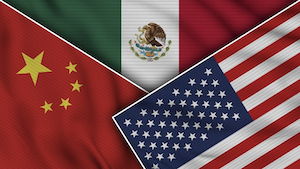By Kerry Wang, Senior Associate Attorney
China’s foreign direct investment (FDI) in Mexico has seen substantial growth in recent years, reflecting a strategic alignment with global economic shifts and regional trade dynamics. This trend positions China as one of the fastest-growing sources of foreign investment in Mexico, with the majority of investments flowing into the manufacturing sector.
Key Reasons for the Surge in Chinese FDI
Economic and Political Pressures
In China, there is a prevailing perception that the United States is attempting to hinder its ascent as a global economic powerhouse. This sentiment has been exacerbated by the ongoing US-China trade war. The trade conflict has not only imposed additional tariffs but also created an environment of uncertainty that has negatively impacted businesses in China. Negotiations between the two nations have been challenging. The lack of a comprehensive resolution continues to weigh heavily on businesses, affecting their operations and strategic decisions. Consequently, Chinese companies are increasingly looking to Mexico as a strategic alternative to mitigate these economic pressures and uncertainties.
Nearshoring Strategy
Despite geopolitical tensions, commercial ties between the U.S. and China remain robust. Chinese companies are increasingly adopting a nearshoring strategy to move production closer to their target markets, primarily the United States. This approach helps mitigate risks associated with long shipping routes and geopolitical tensions. By relocating to Mexico, Chinese firms can leverage the benefits of the United States-Mexico-Canada Agreement (USMCA), which allows products made in Mexico to enter the U.S. duty-free, provided they meet specific requirements.
Mexican Incentives
Mexico has positioned itself as an attractive destination for foreign investment. Several border states offer enhanced security, tax breaks, and infrastructure support, making it easier for companies to set up operations. Additionally, the Mexican government has streamlined procedures for foreign investors, reducing bureaucratic hurdles and providing a more business-friendly environment.
Globalization Trends and the COVID-19 Pandemic
Companies are diversifying production locations to mitigate risks and enhance operational efficiency. By investing in Mexico, Chinese firms align with broader globalization trends, reducing dependency on any single country and spreading out production bases to manage geopolitical tensions and trade disruptions. The COVID-19 pandemic further highlighted the fragility of global supply chains, prompting diversification of manufacturing locations to avoid disruptions. This move not only safeguards operations but also positions firms to better respond to future crises.
Unique Challenges Faced by Chinese Firms:
-Regulatory and Trade Agreement Compliance
The USMCA is designed to facilitate free trade among the three countries, but it comes with stringent rules of origin and content requirements. For Chinese companies, complying with these regulations is essential to benefit from duty-free trade. This often involves complex adjustments to sourcing and manufacturing processes to ensure that products meet the necessary content thresholds. Furthermore, the IMMEX program, which provides benefits to companies engaging in manufacturing or maquila operations in Mexico, requires strict adherence to regulations. Proper documentation, record-keeping, and customs procedures are essential. Non-compliance can lead to penalties or suspension from the program. Additionally, Mexico has its own set of environmental standards and labor laws, which can differ significantly from those in China. These regulations require companies to adapt their business operations and practices, which can be both time-consuming and costly.
-Cultural and Business Practices
Integrating into the local business culture and practices can be challenging for Chinese companies. Understanding and adapting to the Mexican way of doing business is essential for smooth operations and building strong relationships with local stakeholders. Cultural sensitivity and local expertise can significantly enhance this integration process. Language differences can pose communication challenges, particularly when dealing with local authorities, suppliers, and employees. Overcoming these barriers requires investing in bilingual staff or translation services to ensure clear and effective communication.
Supporting Chinese FDI in Mexico
As we have been supporting several Chinese companies involved in the business transition into Mexico over the past few years, our experience has created a template that one can review as far as necessary steps. For example, our Mexico counsel has assisted in setting up some of the largest IMMEX programs in Mexico and advised companies on upgrading facilities to meet environmental standards and altering labor practices to align with local laws. Our team is comprised of members with legal training in China, Mexico, and the U.S., ensuring effective communication and cultural integration for our clients. These language skills have ensured clear communication with Chinese firms, Mexican local authorities, and suppliers, and have helped build strong relationships with local stakeholders. When moving manufacturing to Mexico from China one must ensure that your investments meet all necessary requirements in order to fully benefit from USMCA provisions and the IMMEX program.

